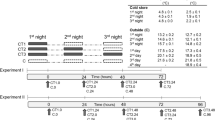Abstract
PYKE1 has lately stated that when raw savoy cabbage was shredded by means of household shredders part of the ascorbic acid disappeared during the ensuing 5–10 minutes and thereafter no further loss occurred during three hours standing ; the extent of the initial loss of ascorbic acid varied with the type of shredder used. His explanation is that the initial loss of ascorbic acid is essentially due to the mechanical rupture of the cells, and will therefore vary with differing types of shredder or grinder.
This is a preview of subscription content, access via your institution
Access options
Subscribe to this journal
Receive 51 print issues and online access
$199.00 per year
only $3.90 per issue
Buy this article
- Purchase on Springer Link
- Instant access to full article PDF
Prices may be subject to local taxes which are calculated during checkout
Similar content being viewed by others
References
NATURE, 149, 499 (1942).
NATURE, 149, 271 (1942).
Author information
Authors and Affiliations
Rights and permissions
About this article
Cite this article
LAMPITT, L., BAKER, L. & PARKINSON, T. Disappearance of the Ascorbic Acid in Raw Cabbage after Mincing or Chopping. Nature 149, 697–698 (1942). https://doi.org/10.1038/149697a0
Issue Date:
DOI: https://doi.org/10.1038/149697a0
This article is cited by
-
Vitamin C from Green Tomatoes
Nature (1942)
-
Parsley as a Rich Source of Vitamin C
Nature (1942)
Comments
By submitting a comment you agree to abide by our Terms and Community Guidelines. If you find something abusive or that does not comply with our terms or guidelines please flag it as inappropriate.



